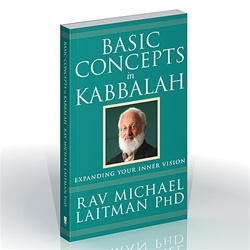Blind and in the Dark
As a person begins to transition from an animal-like existence, concerned only with survival, to the level called “human” or “speaking” in the wisdom of Kabbalah, deep existential questions and feelings of despair often well up. We begin to see such attainments as food, sex, family, money, honor, and power as shallow and unsatisfying, and begin to identify with an inner longing for something more.
Questions that define the human being: the Eternal Question, “Why?”
- Who am I?
- Why do I exist?
- Where did we come from? Where are we going? And what is our purpose here?
- Have we been in this world before?
- Why is there suffering in this world and can we avoid it?
- How can we attain peace, fulfillment, and happiness?
From generation to generation, people try to find answers to these painfully insistent questions. The fact that they continue from generation to generation indicates that we still have not received satisfactory answers to them.
Why the Nearsighted Don’t See the Stars
While studying nature and the universe, we discover that all that surrounds us exists and functions according to precise and purposeful laws. Yet, when we examine ourselves, the zenith of Creation, we find that humanity seemingly exists outside of this system of rational laws.
For example, when we observe how wisely nature created our bodies and how precisely and purposefully every cell in our bodies functions, we are unable to answer the question: “Why does the entire organism exist?”
All that surrounds us is permeated with cause-and-effect connections. Nothing is created without a purpose; the physical world is governed by precise laws of motion, transformation, and circulation. However, the main question – “Why does it all exist (not only us, but the entire universe)?” – remains unanswered. Is there anyone in this world who has not been touched by this question at least once?
The existing scientific theories assert that the world is governed by invariable physical laws that we are unable to influence. Our only task is to live well by using them wisely and to prepare the ground for the future generations. But good living does not resolve the question concerning why these future generations will, or should, exist.
The question of humanity’s origins – whether from a primitive species through evolution, or through extraterrestrial visitations and settlement – does not change the essential questions. There are two primary dates in every person’s life: birth and death. What happens between them can be unique and therefore priceless. It can also be meaningless if at the end of it is darkness and chasm.
Where is our wise, omniscient, coherent nature that does nothing without purpose? Every atom, every cell in the human organism has its cause and purpose; yet, what is the purpose of the entire organism? Perhaps there exist some laws and goals that we have not yet discovered.
How Distance Makes a Difference
We can research something at a lower evolutionary level than our own. We perceive and comprehend the meaning of inanimate, vegetative, and animate existence. But we cannot comprehend the meaning of human existence. Evidently, this understanding can be attained only from a higher existential level.
Our research of the world boils down to the study of how it reacts to our influence on it. We can only research at our own level and not above it. Even when we research at our own level, we study it by applying some impact on the world and measuring the reaction to the impact. We perceive our influence on the world with our five senses: sight, sound, smell, taste, and touch. Otherwise, we may use instruments that expand the sensitivity range of our limited senses.
Finding Spiritual Lenses
Unfortunately, we cannot recognize anything beyond what our senses can perceive and research. It is as though nothing exists but what we perceive. Whatever does seem to exist, lives only in what we sense, and a creature with different senses would experience the same things in a totally different way.
At the same time, we do not feel a lack of sensory organs, such as a sixth finger on our hands. Just as it is impossible to explain the meaning of eyesight to one blind from birth, so, too, will we fail to discover the concealed forms of nature with the research methods we are applying today.
According to Kabbalah, there exists a spiritual world that is imperceptible to our sense organs. At its center is one tiny part – our universe and our planet – the heart of this universe. This sphere of information, thoughts, and emotions affects us through the laws of the material nature and its incidents. It also places us under certain conditions upon which we must act.
The wisdom of Kabbalah provides directions about how we can develop a new sense beyond our five senses—a sixth sense. When we learn to view reality through this new sense, it is as if we have donned a pair of spiritual spectacles, and will then be able to distinguish spiritual worlds. The discovery of these missing lenses, the spiritual sense, enables us to understand the laws that operate spiritual reality. Seeing through the spectacles of Kabbalah, we discover a world of lasting satisfaction and fulfillment.
 “How to View Reality through Spiritual Lenses” is based on the book, Basic Concepts in Kabbalah: Expanding Your Inner Vision by Dr. Michael Laitman.
“How to View Reality through Spiritual Lenses” is based on the book, Basic Concepts in Kabbalah: Expanding Your Inner Vision by Dr. Michael Laitman.


This is really enlightening, thank you!